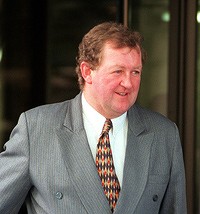
Barrister Paul Scanlon could be disciplined over his courtroom behaviour. Photo: Andrew De La Rue
A senior Victorian barrister could be disciplined after his behaviour caused two retrials and provoked sharp rebukes from Victoria's highest court.
The Court of Appeal said in a recent judgment that Paul Scanlon, QC, should be ''condemned'' over his conduct as defence counsel in a Warrnambool civil trial two years ago that caused a ''miscarriage of justice''. The decision comes five months after the same court ordered a retrial in another case in Melbourne involving Mr Scanlon, which it described as a fiasco. Both cases involved damages claims arising from accidents.
In comments echoed by the Court of Appeal in its decision over the Warrnambool case, Victoria's Chief Justice, Marilyn Warren, cited the Melbourne case in a speech to judges last year as an example of a lawyer motivated by victory ignoring duty to the court.
''There is a line between permissibly robust advocacy and impermissible dereliction of duty,'' she said.
A spokeswoman for Legal Services Commissioner Michael McGarvie said he was ''unable to comment on matters that may or may not be under investigation''.
But The Age believes that Mr McGarvie's predecessor, Victoria Marles, who left the role in December, had begun an investigation into Mr Scanlon's behaviour in the Melbourne case.
In the Warrnambool case, nursing home worker Karen Baulch sued her employer, Lyndoch Warrnambool, for damages after she fell on a polished vinyl floor and injured herself in 2000. At the time of the fall, she had worked 29 of the previous 34 hours. She claimed her employer failed to provide a safe system of work, namely a non-slip floor. She claimed her long working hours caused exhaustion and were a breach of her employer's duty of care to provide a safe system of work.
But a jury ruled in 2008 that Ms Baulch was not injured as a result of her employer's negligence.
Court of Appeal justices Marcia Neave, Bernard Bongiorno and David Byrne late last month ordered a retrial. They found Mr Scanlon had breached the rules of cross-examination, misstated evidence and was unfair to Ms Baulch.
''You might have thought that when this writ was issued and when this case started that this was going to be a case about a bad floor or spillage,'' Mr Scanlon told the jury in closing submissions.
''… There is absolutely no argument that there's nothing wrong with this floor. As I said to a witness, it would be like the old roller derbies with people just going everywhere … Could you imagine a slippery floor in an activities room of a nursing home for elderly patients?''
The justices said the writ made no mention of a wet floor and it was clear Ms Baulch claimed her exhaustion led to the fall. ''To have misstated her case for the purposes of ridiculing it as he did was unfair to the appellant,'' they said.
The justices said nothing that trial judge Justice Jack Forrest did ''was sufficient to counteract the effect of what defence counsel had said. But there was probably nothing his honour could have done, short of discharging the jury and recommencing the trial''.